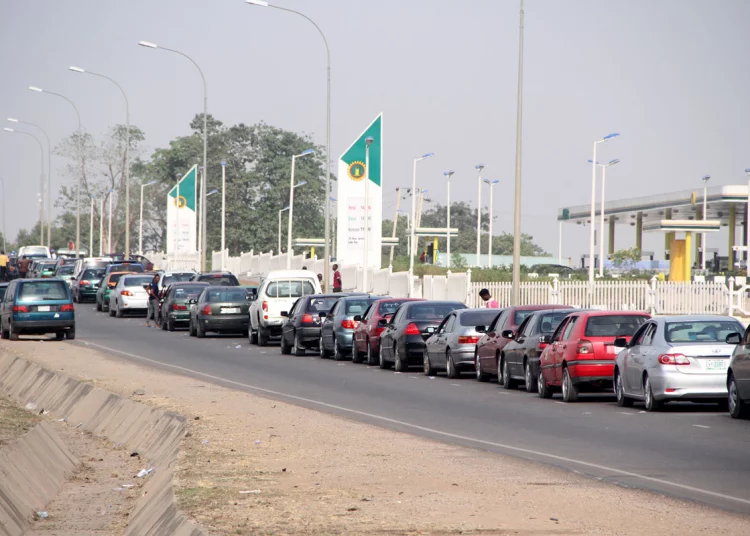Declining global petroleum products refining due to crude supply shortfall is set to worsen Nigeria’s diesel and petrol scarcity, as the country continues to depend on imports of refined product for consumption.
Nigeria is the only member country of the Organisation of Petroleum Exporting Countries (OPEC) that imports 90 to 95 per cent of refined petroleum products to meet its domestic consumption, available data shows.
This is as fuel queues resurfaced in most parts of Lagos State yesterday following the decision of some members of the Independent Petroleum Marketers Association of Nigeria (IPMAN) to shut down their operations.
Chairman of the Lagos state chapter of IPMAN, Akin Akinriade, who confirmed this, explained the recent causes of petrol queues that surfaced in Lagos at the weekend.
In a telephone conversation with our correspondent, Akinriade, said that since December 2021, the Nigerian National Petroleum Company Limited had not supplied products to the Satellite depot, Ejigbo in Lagos.
He said in the last six months, marketers had been buying products from private depots which are now selling above government approved ex-depot prices.
According to him, NNPC approved ex-depot prices is N148 per litre but now private depots are selling between N162 and N165 per litre while regulated pump price is N165.
While denying insinuation that the leadership of IPMAN had directed members to shut down their outlets, he said some of them had shut down because they cannot afford to restock.
“Like I said, we buy petrol from private depot operators between N162 and N165 per litre. Add this to N8 transportation and N2 handling charges, so since government insists we sell at N165 per litre, we need an understanding from the authorities as we as operators cannot subsidise to our customers. So that is the situation now” he explained.
Akinrinade said while the government had fixed N165 per litre as the pump price of Premium Motor Spirit (PMS), the current realities in the market showed that the minimum the product should be retailed at the stations should be N180.
According to him, the current scarcity being witnessed in Lagos is because majority of petrol stations in the state are owned by IPMAN members who are finding it difficult to operate in a hostile environment.
He said: “As you can see, the queues are back and this is the second time we are witnessing it this year. However, this one is peculiar in the sense that for a particular reason, IPMAN members decided to shut their stations.
Nigerians Urged To Embrace Alternative Fuel Amid Global Energy Crisis
“This is not because we are on strike, but because we can no longer do business under this condition.”
Akinrinade said IPMAN members ought to be getting supply from the Pipelines and Product Marketing Company (PPMC) and had made payments of over N1 billion since October 2021.
He said the products were yet to be delivered forcing members to patronise private depots for products while at the same time servicing loans borrowed from banks for their money with PPMC.
Akinrinade said: “Now, these private depot owners have increased the ex-depot price of PMS from N148.17 to N162 per litre. That is the amount they are selling to us.
“When you factor in the handling charge, transportation and running cost of our stations, you will see that even within Lagos, the minimum we can retail petrol is about N180 per litre.
“We want Nigerians to know that IPMAN members are patriotic citizens and we are not out to sabotage the effort of government because we know this hike in petroleum products prices is not peculiar to Nigeria.
“The ongoing conflict between Russia and Ukraine has disrupted the supply chain and the Nigerian government is doing its best to mitigate its impact on our nation.”
He, therefore, urged the government to direct the private depots to revert to the old ex-depot price for PMS or deregulate the downstream sector to allow market forces determine the price.
Akinrinade also advised the government to expedite action on the rehabilitation of the nation’s refineries in order to increase the domestic refining capacity.
He further called for the resumption of pumping products through the PPMC Ejigbo depot, which would enable IPMAN members get supply at a cheaper cost.
Meanwhile, national president of the Association, IPMAN Elder Chinedu Okoronkwo, told our correspondent that his members are loading as usual and nothing so far has indicated that there is shortages in supply from the Nigerian National Petroleum Company Limited.
Though some of my members complain that depots have hiked prices from N148 per litre to about N155 and above. Nevertheless, loading is ongoing because we are all in business so we have to go and load and sell and make profit.
For Lagos it could be a little distribution challenge and unfortunate behaviour of motorists who would not believe when the authorities say there is fuel. Everyone would queue up because of a minor challenge.”
A major marketer who spoke to our correspondent on phone said that products are available.
The marketer who would not want to be named said some petroleum products bearing vessels were expected to berth at the weekend but nevertheless depots are operating at capacity.
Meanwhile, the queues which began to surface from Abule Egba axis in the outskirts of Lagos State is gradually spreading to the Island area.
On the global scene, Rystad Energy, global diesel and petrol markets are witnessing blowout crack spreads in the $50-60 per barrel (bbl) range, reflecting a clear lag in the refining system to respond effectively and decide between supplying diesel or petrol.
Rystad Energy is a research and business intelligence company providing data, tools, analytics and consultancy to clients.
Nigeria spent a total of N4.56 trillion on the importation of premium motor spirit (petrol) in 2021, about 128 per cent higher than the N2 trillion spent on fuel importation in 2020.
This is according to foreign trade data recently published by the National Bureau of Statistics, NBS.
Nigeria also spent N6.3 trillion on Fuels and Lubricants imports in 2021 as against the N2.83 trillion, N2.5 trillion, and N3.8 trillion incurred in 2020, 2019, and 2018 respectively.
The country is currently experiencing one of the worst fuel crises in recent years and fuel queues remain sticky due to protracted clear out of adulterated fuel recently and the challenges with the importation of fuel.
Automotive Gas Oil, AGO, also called diesel prices recently rose to over N700 per litre and is also imported. and according to the data, importation of petroleum products other than the fuel cost N1.7 trillion which includes AGO.
The Nigerian National Petroleum Company, NNPC, Limited NNPC reported in 2020 that it earned a revenue of N151.8 billion in from premium motor spirit import and another N39.9 billion in AGO.
Rystad noted that the dwindling refining capacity is coming as recent news indicated that Dangote Refinery is unable to secure a commissioning team, Rystad noted.
But this report was debunked as Engr. Babajide Soyode the Technical Consultant to the group president/CEO of Dangote Industries Limited for Refinery and Petrochemicals Projects, said the commissioning of the refinery is on track.
Soyode told our Correspondent in a telephone conversation that the refinery is coming on stream as most challenges brought about by COVID-19 have been resolved.
He said Nigeria would not suffer any hiccups should there be supply disruption from Europe as the refinery capacity can take care of local market and even more for export.
On his part, Muda Yusuf, CEO, Centre for the Promotion of Private Enterprise, CPPE, urged government to ensure Dangote received all supports needed to commission the refinery as that will go a long way to take care of the seeming challenge declining capacity in Europe will produce.
Yusuf also called on government to accelerate repair of the four local refineries, some of whose contracts had been awarded.
He warned that energy crises could lead to social unrest like what Sri Lanka is currently facing.
According to him, Nigerian government is facing bankruptcy following exorbitant energy prices and subsidy regime.
Rystad noted that the precarious situation is driven by inventory stocks across the globe being at their lowest levels historically and, therefore, unable to provide the necessary shock absorbers.
According to Rystad, the loss of Russian refining owing to operational outages and product containment challenges had caused a diesel/gasoline hole greater than 1 million barrels per day (bpd) in Europe that is not easy to plug.
“Diesel is the lifeblood of the global economy, essential to vital sectors such as agriculture, construction, and transportation – its price impacts almost all supply chains and goods. Governments face tough decisions. They can assist consumers by dropping taxes on diesel, but this will likely only increase demand, which may support the overall economy but will worsen the existing tight supply situation.
“If supply does not improve, governments will be forced to enact emergency plans to limit sales to consumers to ensure essential sectors are kept going,” says Per Magnus Nysveen, Head of Analysis at Rystad Energy
On the demand side, the recovery is resilient as residual Covid-related restrictions are being removed. The US Centers for Disease Control and Prevention recommended removing all Covid testing requirements for incoming flights is one such clear indicator.
On the supply side, Russia’s invasion of Ukraine has disrupted product flows and crude flows to the European market at a time when the rest of the world has limited ways in which to respond.
The loss of crude supply has hindered the shrinking European refining sector’s ability to run at high utilization rates and has accelerated a downward trend in Europe which has lost 2 million bpd of crude refining since its peak capacity of 17.5 million bpd in 2005.
The US has been following a similar trend, losing between 1 million and 1.5 million bpd of refining capacity in the last 3-4 years. The move to phase out Hydrofluoric Acid Alkylation technology and lower availability of imported vacuum gas oil/residues have dented the US refining sector’s ability to increase gasoline production.
Outside the European Union and the US, refinery capacity has been growing primarily to meet rising domestic demand. However, the pandemic has severely impacted the pace of additions with many Middle Eastern, African, and Asian refinery projects reporting delays owing to supply chain and resource issues.
Latin American refining was already in decline before the pandemic and does not have much to offer, let alone meet domestic product supply.
Overall, the cost of refining has gone up alongside inflated gas, hydrogen, and utility costs. Thus, a constrained refining system as demand has recovered has resulted in precariously lower days of supply cover in most countries. Many have mandated higher days of stock cover making it hard to solve regional product imbalances with trade flows.
To meet rising demand, refining will need to increase by 4.6 million bpd from June to August 2022, compared to current projections of 3.3 million bpd. With a limited increase in overall runs, the second-order lever of diesel versus gasoline optimisation does not have much to offer. Diesel/jet fuel maximization is being pursued and indirectly fueling gasoline crack spreads





